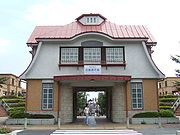
Den-en-chofu Station
Encyclopedia

Tokyo
, ; officially , is one of the 47 prefectures of Japan. Tokyo is the capital of Japan, the center of the Greater Tokyo Area, and the largest metropolitan area of Japan. It is the seat of the Japanese government and the Imperial Palace, and the home of the Japanese Imperial Family...
. It is roughly a 15-minute train journey from Den-en-chōfu to Shibuya Station
Shibuya Station
is a train station located in Shibuya, Tokyo, Japan. With 2.4 million passengers on an average weekday in 2004, it is the fourth-busiest commuter rail station in Japan handling a large amount of commuter traffic between the center city and suburbs to the south and west.-JR East:*Saikyō Line /...
.
The station is in Den-en-chōfu
Den-en-chofu
, meaning "garden suburb," is a district in Ōta Ward in southern Tokyo. It lies along the Tama River, the natural border between Tokyo and Kawasaki, Kanagawa. It is served by Den-en-chōfu Station on the Tōkyū Tōyoko and Meguro lines...
, within the Ōta
Ota, Tokyo
is one of the 23 Special wards of Tokyo, Japan.As of May 1, 2011, the ward has an estimated population of 676,458, with 348,492 households, and a population density of 11,376.69 persons per km²...
ward of suburban SSW Tokyo. This was one of the original garden suburbs of Tokyo, running along the Tama River
Tama River
The is a major river in Yamanashi, Kanagawa and Tokyo Prefectures on Honshū, Japan. It is officially classified as a Class 1 river by the Japanese government....
. The design of the town was heavily influenced by Sir Ebenezer Howard's "Garden cities of tomorrow", published in London in the early 1900s.
The original 1920s station building was torn down in the late eighties to make way for the new modern station building. In a nod to its past and in order to retain its unique identity, a copy of the original building was constructed on elevated ground and now acts as an entranceway to the plaza in front of the subway station entrance.
The area is considered by many as one of the most affluent in Tokyo. Real estate is extremely expensive and the immediate vicinity on the west side of the station serves as home to many celebrities, politicians and successful entrepreneurs. The west side of the station has only a handful of shops and businesses surrounding it.
Lines
- Tokyu Corporation
Station layout
| 1 | ■Toyoko Line | Musashi-Kosugi, Hiyoshi, Kikuna, Yokohama, (Minatomirai Line) Motomachi-Chūkagai |
| 3 | ■Meguro Line | Ōokayama, Meguro (Tokyo Metro Namboku Line Tokyo Metro Namboku Line The is a subway line owned and operated by Tokyo Metro in Tokyo, Japan. Its name literally means South-North Line. The line runs between Meguro in Shinagawa and Akabane-Iwabuchi in Kita... ) Akabane-Iwabuchi, (Saitama Rapid Railway Line Saitama Rapid Railway Line The is the continuation of the Namboku Line, starting at Akabane-Iwabuchi station in Tokyo and ending at Urawa Misono Station in Saitama. It was completed on March 28, 2001.... ) Urawa-Misono (Toei Mita Line Toei Mita Line The is a subway line of the Tokyo Metropolitan Bureau of Transportation network in Tokyo, Japan. The line runs between Nishi-Takashimadaira in Itabashi and Meguro in Shinagawa. Trains continue with direct service into the Meguro Line of Tokyu Corporation for... ) Nishi-Takashimadaira |
| 4 | ■Toyoko Line | Jiyūgaoka, Naka-Meguro, Shibuya, (Tokyo Metro Hibiya Line Tokyo Metro Hibiya Line The is a metro line owned and operated by Tokyo Metro located in Tokyo, Japan. The line was named after the district of Hibiya, under which it passes.-Overview:The Hibiya Line runs between in Meguro and in Adachi... )Kita-Senju |

